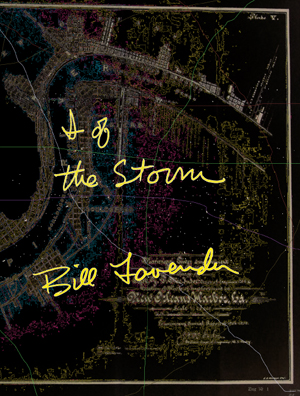I
of the Storm, by Bill
Lavender
Trembling
Pillow Press
ISBN 0-9790702-0-1
Paper- $10.00
Bookstores: Email for
further information.
...abuzz with language or like a lake’s surface
running at night with 6-inch waves.
—Skip Fox
It's as
if a Greek chorus had found its way into the mouth an everyman in
the local bar of the mind, recounting the inner life of America from
the assassination of Kennedy to catastrophe of Katrina. I
of the Storm is a talk
poem of the long dark night of the soul. Lavender's unrelenting colloquial
yarn weaves a spell in breathlessly extended lines of vivid verse that refuse
to give up, against all odds.
—Charles Bernstein
I of the Storm is Bill Lavender's brilliant personal
aftermath mayhem of disconnected thought blowing off teh charts,
all bubbling, frothy boards and nails and mental debris overflowing
the body of poetry, which examines itself for signs of liife, while
continuing to row through cold black water towards a solitary stranger
stranded on a roof.
—Charles Borkhius
The Storm questioned every I with its devastating Eye and how this
I met that gaze is the story we are all going to write for a long
time to come. Bill Lavender's centrifuge spins his I in his own lyric
and indispensible language.
—Andrei Codrescu
Bill Lavender's poetry is at once in and on and from
and for the current storms: Katrina, the Bush administration, the
new bar on the block. A mongrel mix of juicy gossip and Slavoj Zizek,
southern yarn and New York school irony, paranoia and anti-pastoral,
rootedness and road trip, drunkenness and sheer sobriety. There could
be no better I than Bill Lavender's to assimilate so much
raw, often rank, detail. This is a crucial, home-made poetry of witness;
miss it at your peril.
—Susan M. Schultz
Expansive, autobiographical, philosophical, farcical,
musical, utterly engaging, Bill Lavender proves in this book his
kinship (great-grand-nephew?) with France's immortal Jacques Prevert.
Makes one laugh and cry and sometimes both at the same time. A one-man
chorale of invincible life, rising out of floods and exiles and returns.
—Anselm Hollo

